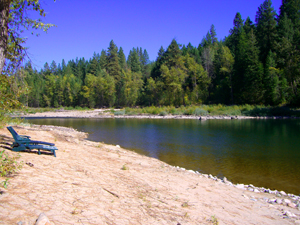KETTLE RIVER Q&A - Will the proposed Water Sustainability Act bring B.C.’s water management into the 21st Century?
Kettle River Q&A – Will the proposed Water Sustainability Act bring B.C.’s water management into the 21st Century?
Last Friday the provincial government released a legislative proposal for the new Water Sustainability Act (WSA), which is a major upgrade to the century-old Water Act.
The new legislation would add regulation of groundwater, require the consideration of environmental flow needs in water management, enhance the water management framework and provide new tools to respond to water management issues.
The Province intends that the new legislation will be more flexible and efficient than the Water Act, increase certainty and clarity around surface and groundwater supplies, and enable wider participation in decision-making about water.
Starting in 2009, the Ministry of Environment led a policy development process by holding a series of workshops and releasing proposals and regular blog updates. They heard from municipalities, First Nations and industry organizations, as well as over two thousand citizen submissions.
Since 2011, B.C. has been working on the new Act, trying to reconcile the very different views offered about licencing, the scope of groundwater regulation, and maintaining river flows.
Their work is cut out for them.
Earlier this summer we learned that Nestlé Waters Canada was withdrawing 265 million litres of fresh water every year from a well near Hope – without paying a dime or even measuring and reporting on how much they use.
Under the proposed Act, all wells would have to be registered and water users (except domestic) would be required to report on use and pay a modest fee. According to Nelson Jatel, Water Stewardship Director for the Okanagan Basin Water Board, “regulating groundwater in the same way as surface water is exactly what needs to happen.”
While the pricing scheme still needs to be developed, under current rates Nestlé would have to pay only $228 annually. This has raised some eyebrows, but the proposal recognizes that prices need to increase to cover the costs of administering and managing water licences and approvals.
“I understand that the proposed new legislation process will seriously affect our groundwater by the licencing process,” said Steve Babakaiff, Administrator of SION Improvement District.
“The B.C. Water Supply Association is dedicated to advancing important source water protection initiatives and we are firmly committed to a thorough review and critique of the draft Water Sustainability Act legislation when it is finally released.”
Other people are concerned about their capacity to manage drinking water, especially in small community systems. While drinking water is administered by Health Authorities under the Drinking Water Protection Act, there are clear connections between water management planning, source water protection, and water distribution.
For instance, the 22-member Fife Water Users Community has been on continuous boil-water advisory for years. “We have a huge issue with our drinking water in small community systems,” according to Kathy O’Malley of Fife. “Interior Health Authority has not enabled options for small systems to meet their standards, and we need more technical and financial support to be viable.”
A key part of the proposal is improving decision-making, authority and accountability for water management. Many stakeholders requested that B.C. improve water governance arrangements, especially by increasing involvement for communities affected by water management decisions.
The proposal does not name a particular governance model such as watershed agencies, but the Province will create a water governance ‘framework’ that allows flexible decision-making solutions to be developed in different regions while retaining ultimate regulatory authority at the provincial level.
“That’s fine if the Province wants to retain control, as long as they are properly resourced and provide reliable ‘go-to’ people in different regions to support local involvement in water management decisions,” said Grace McGregor, RDKB Area ‘C’ Director and Chair of the Kettle River Advisory Group. “But it’s clear the whole system needs to work better for rural watersheds and community water systems alike.”
Jatel said the proposed improvements are a good starting point for the major work of drafting and passing legislation and developing regulations. “This paper signals that the Province is taking a leadership role and enabling the conversations that need to happen at the grassroots level to support good decision-making.”
Comments are due by November 15, which is a tight timeline for stakeholder groups who need to pass comments through committees, councils and Boards of Directors. “This happens again and again – as usual we are forced through a short timeline that doesn’t allow our committees to review material before going to the Board,” said McGregor.
The legislative proposal paper and other background materials are posted at http://engage.gov.bc.ca/watersustainabilityact/. The Advisory Group is crafting a response to the proposal and will share ideas about how the proposed change in water laws may affect people and waterways in the Kettle River watershed.
“The bottom line,” said Babakaiff, “is that we need to get our hands on the actual draft legislation to make sure it isn’t just window dressing on the old Water Act.”
– Graham Watt is the coordinator of the Kettle River Watershed Management Plan for the RDKB, and is working with a Stakeholder Advisory Group from across the region to develop the plan. Email plan@kettleriver.ca


























Comments